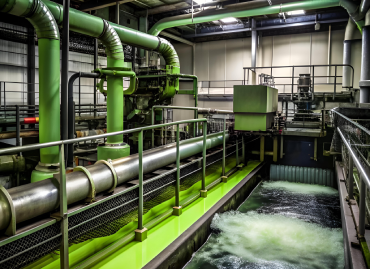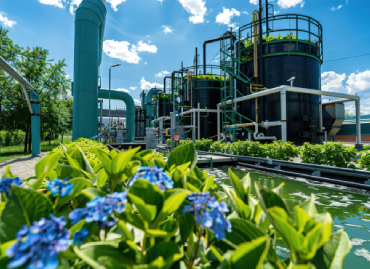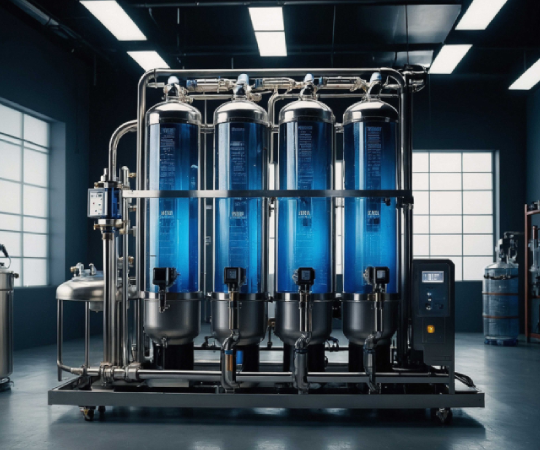- By Admin
- 20 Aug 2025
- ETP Plant
Comprehensive Water and Wastewater Treatment Systems for Hotels and Resorts with Sustainability Focus
The hospitality industry in India, especially in tourism-driven hubs like Maharashtra's Mumbai, Pune, and coastal Konkan regions, has seen a rapid rise in hotel infrastructure due to the growing domestic and international tourism market. This rapid growth has led to a marked increase in water usage within hospitality properties, from budget hotels to luxury resorts. Water is crucial for various operations, including guest services, kitchens, laundry, swimming pools, cooling systems, and landscape maintenance. Proper water quality is a fundamental part of ensuring hygiene, guest satisfaction, and maintaining the longevity of plumbing and appliances.
For instance, soft water is commonly preferred in hotels to prevent scale buildup in plumbing systems and equipment. Similarly, filtered water is necessary for kitchens, spas, and pools to maintain the highest standards of hygiene and safety. The seasonal peaks in tourist arrivals further increase the water demand. As a result, efficient water sourcing, treatment, and recycling practices are essential for ensuring sustainability and minimising the ecological impact of hotels and resorts.
"In the hospitality sector, water isn’t just a resource—it’s part of the guest experience. Ensuring clean water for consumption and safely treating wastewater are key to operational excellence, sustainability, and environmental responsibility. Smart water management reflects not only on cost savings but also on a brand’s ethical commitment."
Wastewater Generation and Management in Hotels
Hotels and resorts generate significant amounts of wastewater every day, with major sources including bathrooms, laundry services, kitchens, and swimming pools. Wastewater from luxury resorts, spas, and wellness centres often contains oils, salts, and chemicals, adding complexity to the treatment process. Other common wastewater sources are floor cleaning and pool backwash.
The wastewater produced in hospitality facilities contains a variety of contaminants, such as soap, grease, food waste, detergents, and human waste. These pollutants can harm both public health and local ecosystems if discharged untreated. Consequently, wastewater treatment has become a fundamental part of the hospitality industry's waste management strategy.


Types of Wastewater in Hotels: Greywater and Black Water
There are two primary categories of wastewater produced by hotels: greywater and blackwater. Greywater is generated from showers, sinks, laundry, and kitchen areas and typically contains oils, detergents, and food waste. On the other hand, black water comes from toilets and contains pathogens, organic matter, and high Biological Oxygen Demand (BOD).
In addition to these, high-end hotels may also produce chemical-laden waste from spas, pools, and cleaning agents, which require specialised treatment to prevent contamination. All wastewater streams—whether grey or black—must be thoroughly treated to meet municipal discharge standards and avoid environmental degradation.
STPs, Greywater Recycling, and Sustainable Practices
To efficiently manage wastewater, hotels often implement compact Sewage Treatment Plants (STPs) and greywater recycling units. STPs typically combine biological treatment methods like Moving Bed Biofilm Reactors (MBBR) or Sequencing Batch Reactors (SBR), along with tertiary treatments such as filtration and disinfection, to ensure the water is safe for reuse. For instance, treated water can be reused for non-potable purposes such as toilet flushing or landscape irrigation.
Hotels that have high water demand, such as luxury resorts, also integrate rainwater harvesting systems to supplement freshwater sourcing. Grease traps and oil separators are installed in kitchen and laundry facilities to remove high grease content before the water enters the treatment system. These measures help reduce freshwater demand and ensure the facility operates in an environmentally responsible manner.
Advanced Filtration, Automation, and Real-Time Monitoring
Modern hotels increasingly invest in advanced filtration and automated water treatment systems that improve water efficiency and sustainability. Technologies such as Membrane Bioreactors (MBR), Ultrafiltration (UF), and Reverse Osmosis (RO) are commonly used for polishing treated water. This treated water can then be reused in various applications such as landscaping, HVAC systems, and irrigation.
Additionally, hotels are implementing real-time monitoring systems and automated controls to optimise treatment processes. This allows them to adjust operations based on real-time water quality data, ensuring the treatment systems run efficiently while minimising energy consumption. Zero Liquid Discharge (ZLD) systems are becoming a popular trend in upscale hotels and resorts. ZLD ensures that no wastewater is discharged, and all effluents are treated and recycled back into the system, reducing water wastage and lowering operational costs. ZLD not only supports water conservation efforts but also helps hotels earn eco-certifications, such as LEED, enhancing their sustainability credentials.
Customised Water Treatment Solutions for Hospitality
Our company offers tailored water and wastewater treatment solutions designed to meet the specific needs of hotels, resorts, and other hospitality properties. We understand that each facility has unique requirements based on its operational scale, seasonal water demand, and space constraints. As such, we provide customised systems that include STPs, WTPs, ETPs, RO units, and greywater recycling systems.
STPs, WTPs, ETPs, RO units, and greywater recycling systems. Our services include site evaluation, system design, equipment supply, installation, automation, and post-commissioning support. Whether it's a boutique resort or a large luxury hotel chain, we ensure high-performance systems that reduce water costs, ensure regulatory compliance, and contribute to sustainability goals.
Summary And Conclusion
Sustainable water management and wastewater treatment are essential components of operational efficiency in the hospitality industry. The increasing demand for water in hotels and resorts necessitates the adoption of advanced treatment systems, including STPs, RO, MBR, and greywater recycling technologies. These systems not only ensure compliance with environmental regulations but also promote water conservation and cost savings. The implementation of Zero Liquid Discharge (ZLD) systems is an emerging trend, supporting the goal of zero wastewater discharge. By embracing these technologies, hotels can maintain high operational standards, meet guest expectations, and enhance their environmental stewardship.































































